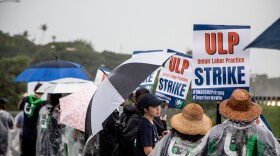The newly established Essential Rural Medical Air Transport program is teaming up with Pūlama Ka Heke on Molokaʻi and Lānaʻi Kināʻole to allow air transportation for non-emergency medical services that aren't offered on these islands.
Lani Ozaki, the executive director of Pūlama Ka Heke, emphasized the importance of setting up a stable transportation system for residents of Molokaʻi and Lānaʻi, islands that often lack specialized medical care.
"This is going to be a game changer for our island as far as increasing access to medical care,” Ozaki said. “Not only will this help transport our patients to Oʻahu and possibly Maui, but if we can fly specialists here, that means we can build our provider network on island to serve more people here, rather than flying everyone out.”
Currently, Molokaʻi relies solely on Mokulele Airlines for patient transportation, but it has proven to be somewhat unreliable in the past.
"Weʻve unfortunately had a lot of issues with patients’ flights getting delayed or canceled. Many of our patients are older folks who can’t afford to sit around and wait for their flight, especially if it gets pushed a day because now they’re scrambling to find a place to stay,” Ozaki said.
"A lot of kūpuna I work with have just given up on going to their appointments because of the hassle of unreliable transportation,” she added.
Lānaʻi uses the same airline, as well as the Lānaʻi-Maui ferry. However, Valerie Janikowski, Lānaʻi Kināʻole’s program administrator, stated there is still a high demand for easier and more accessible specialists.
“It goes both ways right now. We send patients to Maui and Oʻahu, and specialists will sometimes also come to Lānaʻi,” Janikowski said. “But there isn't a specialist coming regularly enough to meet the needs of the whole community.”
In 2024, the state Legislature appropriated $2 million to initially establish the ERMAT pilot program. Of this funding, Molokaʻi will get roughly $1.2 million, and Lānaʻi will get just under $550,000.
Most of this will go toward transportation, as Molokaʻi will be partnering with Pacific Air Charter to use two of its aircraft to travel between the islands. The rest of the funding will go toward insurance, and coordinators for logistics and administration.
The program is hoping to start mid-May in Molokaʻi, with Lānaʻi following shortly after.
Hawaiʻi Public Radio exists to serve all of Hawai‘i, and it's the people of Hawai‘i who keep us independent and strong. Help keep us strong to serve you in the future. Donate today.






